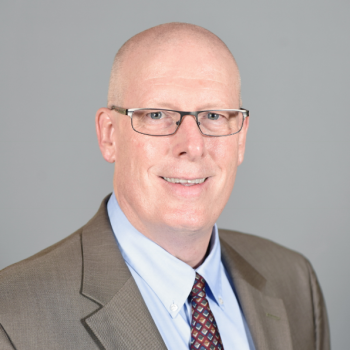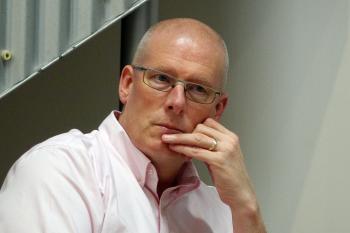Ross Emmett will serve for two years as president of the society, having already served two years as the elected vice president
Ross Emmett, director of Arizona State University’s Center for the Study of Economic Liberty and professor at the School of Civic and Economic Thought and Leadership, recently began his term as president of the History of Economics Society, an organization dedicated to “encouraging interest, fostering scholarship and promoting discussion among scholars and professionals in the field of history of economics and related disciplines.”
Following the organization’s constitutional guidelines, Emmett will serve for two years as president of the society, having already served two years as the elected vice president. According to Emmett, this allows the society’s elected officials a reasonable time in office for accomplishment of their most important duty: planning and hosting conferences that provide a forum for established and young scholars to advance new ideas and research. Young scholars can apply for funding for the conference through the Warren and Sylvia Samuels Fund, a resource dedicated to the promotion of young academics.  Ross Emmett, director of ASU’s Center for the Study of Economic Liberty and professor at the School of Civic and Economic Thought and Leadership. Download Full Image
Ross Emmett, director of ASU’s Center for the Study of Economic Liberty and professor at the School of Civic and Economic Thought and Leadership. Download Full Image
Emmett sees the History of Economics Society conferences as a great opportunity to “provide mentorship to young scholars … and have senior scholars comment on their scholarship.” As a young scholar, Emmett won best dissertation in 1992 for his work, “The Economist as Philosopher: Frank H. Knight and American Social Science During the Twenties and Thirties.”
More than 300 international members of the History of Economics Society will be invited to meet in Vancouver, British Columbia, in January 2023 to discuss research materials and papers in the conference curated by Emmett and his team. Conference sessions and themes are organized around papers and research proposals submitted well in advance of the meeting; this approach allows for submissions from a broad range of thoughts and ideas, rather than responses to a prescriptive call.
Per Emmett: “We want everyone to attend. We get Marxists and libertarians, conservatives and liberals, historians and philosophers.” Emmett, a self-described member of "the dismal science," corrected the author’s admiration for this egalitarian approach, insisting that pragmatism is the driving factor. He is an economist, after all.
Since joining ASU in 2018, Emmett has taught three different history of economics-related courses and is regularizing a cross-listed history of economic thought course with the School of Civic and Economic Thought and Leadership and the W. P. Carey Department of Economics. As director of the Center for the Study of Economic Liberty, Emmett organized and held the Winter Institute for the History of Economic Thought in 2019 and 2020, and he is planning for the 2022 offering. Additionally, center researchers publish an annual report titled “Doing Business North America," a project that “annually provides objective measures of the scale and scope of business regulations in 130 cities across 92 states, provinces and federal districts of the U.S., Canada and Mexico. It uses these measures to score and rank cities in regard to how easy or difficult it is to set up, operate and shut down a business.”
A fuller description of Emmett’s research and teaching can be found in his ASU profile.
Most recently, Emmett has started a new research program, Economists on the Indigenous Peoples of North America, with the first foray into the subject being a paper titled “Frank Amasa Walker and the Indigenous Peoples of North America.” This will be presented at the January 2022 Allied Social Science Association meeting, which is the largest gathering of economists globally, with more than 13,000 attendees.
Professor Ross Emmett defends 5 claims about innovation to kick off series 'Perspectives on Economic Liberty'
Last spring, Arizona State University's School of Civic and Economic Thought and Leadership, in partnership with the W. P. Carey School of Business, welcomed Ross Emmett as the new director of the Center for the Study of Economic Liberty. The center is a hub for research and programs dedicated to evaluating the contribution of economic liberty to human prosperity and well-being.
Emmett says his vision for the center is not as a policy think tank, but rather as a unit somewhere between academic research and implementation.  Ross Emmett, director of the Center for the Study of Economic Liberty. Download Full Image
Ross Emmett, director of the Center for the Study of Economic Liberty. Download Full Image
"If you think of the production of knowledge as a triangle," Emmett said, "with academic research at the top, the translation of research via public intellectuals in the middle, and the various ways of implementing research in public policy at the bottom, then the center would sit somewhere in the space between the academic work and the public intellectual role.”
Emmett joined ASU from Michigan State University, where he taught political economy, political theory and constitutional democracy in James Madison College. His specific research interests are in the history of economic thought, and in particular, the work of Adam Smith, T. Robert Malthus, and Frank H. Knight.
The moment he arrived on campus, after adjusting to the absence of snow, Emmett began setting big plans in motion to rejuvenate the center. In addition to teaching in the School of Civic and Economic Thought and Leadership, Emmett and his team are developing exciting research tools, publications and a lecture series, beginning this fall.
For the next year or so, the center will focus on the overarching theme of "perspectives on economic liberty," beginning with a lecture series of the same name. Emmett says that using the expression “economic liberty” is a way of talking about freedom in markets, freedom of individual choice and action, and the rule of law.
“The purpose of the series is to consider the cases for and against economic liberty, how it fits or doesn't fit with political liberty, and to ask, is one prior to the other, or are they companions?
“In these lectures, we will explore social and cultural issues around economic liberty as well as policy questions related to issues like trade and loss of jobs, minimum wage, right to work, labor regulation, and occupational licensing," he said. "These are all considerations of the benefits and potential costs in a world that accepts economic liberty.”
Emmett will kick off the series with a lecture on “The Constitution of Innovation,” in which he defines "constitution" not as a set of rules and processes, but as an environment in which systems can operate interdependently.
“Americans tend to think of ‘constitutions’ as pieces of paper that defend rights and define political processes," Emmett said. "The British tradition of constitutional analysis is more ecological: Winston Churchill compared it to daily exercise, which ensures that the various systems in our bodies function well together. FA Hayek had the British constitutional tradition in mind when he titled the only book he wrote while in America, "The Constitution of Liberty." There he argued that economic liberty undergirded economic progress because it created a societal constitution that encouraged Smithian innovation. Hayek worried that we might be about to lose that constitutional perspective. For a time, from about 1980 until the last few years, I argued that he was wrong. But perhaps we have reason to worry again. Willful disregard for the Smithian tradition threatens once again to undo a healthy constitution of innovation.”
Emmett’s talk takes place at 4:30 p.m. Aug. 23, in West Hall, room 135. RSVP here. The next two events in the series are talks by Tony Gill: "An Economic Defense of Tipping" and "Religious Freedom and Economic Liberty."

ASU professor begins term as president of History of Economics Society - ASU News Now
Read More
No comments:
Post a Comment